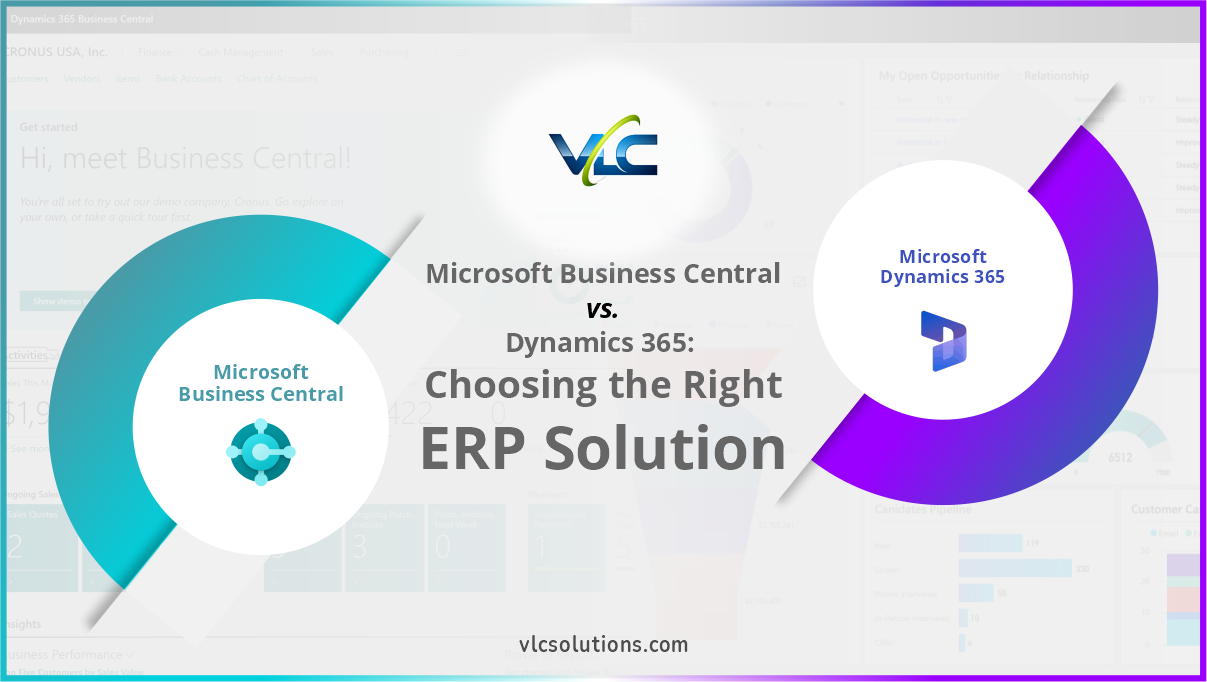Microsoft Business Central vs. Dynamics 365: Choosing the Right ERP Solution
Organizations need robust Enterprise Resource Planning (ERP) solutions to streamline operations, enhance productivity, and stay competitive. Two popular choices from Microsoft’s ERP portfolio are Microsoft Dynamics 365 and Microsoft Business Central. While both solutions offer powerful features, they cater to different business needs and sizes. This blog explores the key differences and considerations that can help you choose the right ERP solution for your organization.
Microsoft Dynamics 365: The Comprehensive ERP Suite
Microsoft Dynamics 365 is a complete array of business applications encompassing a wide range of functions, including Sales, Customer Service, Field Service, Finance and Operations, Supply Chain Management, and more. Its cloud-based solution offers scalability and flexibility, making it suitable for large enterprises with complex needs. Here are some key aspects to consider when evaluating Dynamics 365:
Full Suite of Applications
Dynamics 365 provides many applications that can address various aspects of your business. This includes CRM, human resources, financials, supply chain management, and more. If your organization needs an all-in-one solution that seamlessly integrates different departments, Dynamics 365 is a strong contender.
Scalability
Dynamics 365 is highly scalable, which makes it suitable for large enterprises with extensive operations and global reach. Whether your organization has a few hundred employees or thousands, Dynamics 365 can adapt to your growing needs.
Integration Capabilities
Dynamics 365 is built to integrate with other Microsoft products and services, like Office 365, Power BI, and Azure. This integration can provide a seamless user experience and help achieve better insights through data analytics.
Complex Business Processes
If your organization has complex business processes that require customization, Dynamics 365 offers extensive customization options through Power Apps and Power Automate. This lets you tailor the solution to your unique requirements.
Higher Cost of Ownership
While Dynamics 365 offers an extensive range of features, it comes with a higher total cost of ownership (TCO) than Business Central. Licensing, implementation, and ongoing maintenance costs can be substantial, especially for smaller businesses.
Microsoft Business Central: The ERP Solution for SMBs
Microsoft Business Central, on the other hand, is meant specifically for small to medium-sized businesses (SMBs). It offers a more compact set of features compared to Dynamics 365 but is cost-effective and easy to implement. Here’s why Business Central might be the right choice for your SMB:
Simplicity
Business Central is known for its user-friendly interface and straightforward implementation process. SMBs often have limited IT resources and may need more capacity for complex ERP deployments. Business Central provides a simpler, out-of-the-box solution that can be up and running quickly.
Cost-Effective
One of the most significant advantages of Business Central for SMBs is its affordability. The licensing costs are lower, making it accessible to organizations with tighter budgets. Additionally, the reduced complexity of the solution can result in lower implementation and maintenance costs.
Rapid Implementation
Business Central’s pre-configured templates and industry-specific solutions allow for rapid deployment. SMBs can start benefiting from the system sooner and without the need for extensive customization.
- Core Financial and Inventory Management
While Business Central may need more extensive features of Dynamics 365, it excels in core financial and inventory management functions. If your SMB primarily requires tools for financial tracking, order processing, and inventory management, Business Central is a strong choice. - Scalable for Growing SMBs
Business Central is not just for small businesses; it can also accommodate the growth of SMBs. As your business scales, you can add more modules or customize the solution to meet your evolving needs.
Choosing the Right Solution for Your Organization
Now that we’ve looked at the core differences between Microsoft Dynamics 365 and Microsoft Business Central, how do you determine which one is the right fit for your organization? Consider the following factors:
Business Size and Complexity
The size and complexity of your organization play a crucial role in your ERP selection. If you are a large enterprise with complex operations, multiple departments, and a need for extensive customization, Dynamics 365 may be the better choice. However, if you are an SMB with succinct requirements and a limited budget, Business Central is likely the more suitable option.
Budget
Budget considerations are paramount in ERP selection. Dynamics 365, with its comprehensive suite of applications, is usually more expensive both in terms of licensing and implementation. On the other hand, Business Central is cost-effective and can be a better fit for organizations with limited financial resources.
Implementation Timeline
Consider how quickly you need to implement your ERP solution. Business Central’s simplicity and pre-configured templates enable faster deployments, making it a better choice for organizations that need to get up and running quickly. Dynamics 365 implementations may take longer due to their complexity.
Growth Plans
Think about your organization’s growth plans. If you anticipate significant growth shortly, choosing a solution that can scale with you may be wise. While Business Central can accommodate growing SMBs, Dynamics 365 is better equipped to handle the needs of larger enterprises.
Industry-Specific Requirements
Consider whether your organization has industry-specific requirements that require customization. Dynamics 365 offers more extensive customization options, making it suitable for organizations with unique needs. Business Central may be sufficient if your industry follows standard processes.
Choosing between Microsoft Dynamics 365 and Microsoft Business Central ultimately depends on your organization’s size, complexity, budget, and specific requirements. Dynamics 365 is a robust and comprehensive solution suitable for large enterprises, while Business Central is cost-effective and tailored for SMBs. Carefully evaluate your needs and priorities to make a dynamic decision to let your organization thrive in the ever-evolving business landscape.
